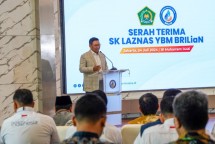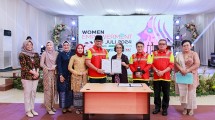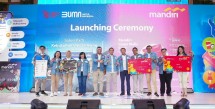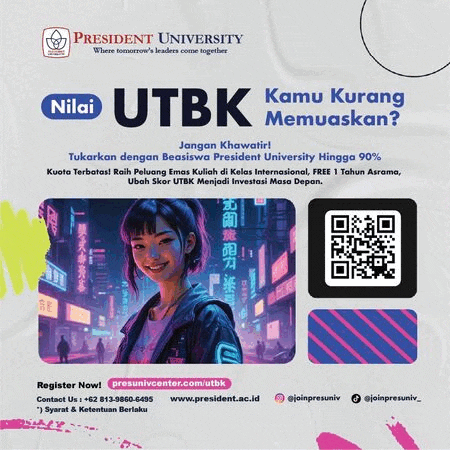Strategic Development of Health-Related Assistance Services in Post-Covid-19 Indonesia using PESTLE Analysis
Oleh : Gloria Dewi Hanapu, B.SM, Master In Management Of Technology, President University | Minggu, 19 Mei 2024 - 21:35 WIB

Industri kesehatan
INDUSTRY.co.id - The Covid-19 pandemic has dramatically reshaped the global healthcare landscape, highlighting both vulnerabilities and opportunities within health-related services. As Indonesia emerges from the pandemic, there is an urgent need to reassess and develop robust strategies for health-related assistance services to address the evolving healthcare needs of its population.
The health sector has consistently experienced growth in recent years, and projections indicate that this trend will continue in the foreseeable future. The term "Medical Concierge" or "Healthcare Concierge" has become increasingly prevalent among hospitals and other healthcare industries.
Illness can strike at any time, and from a hospital perspective, it is evident that there has been a yearly increase in the number of individuals seeking treatment for various ailments.
Prior to 2019, before the advent of Covid-19 in Indonesia, there was a noticeable rise in the incidence of diseases, the number of practicing doctors, and the number of hospitals.
During this period, individuals seeking hospital care included those with chronic conditions as well as those with non-chronic ailments.
The mission is to provide premium health assistance services to the people of Indonesia, catering to specific groups while coordinating community and health services across the country.
To achieve this goal, the market penetration strategy is chosen, which involves promotional activities to attract public interest and introduce the service that should be provided to potential customers.
The marketing strategy will utilize various advertising networks, such as brochures and social media, on creating awareness and building brand recognition. In addition, customer service in the form of special promos and discounts will be provided to enhance the customer experience and attract more customers.
The business development aspect of the plan involves expanding the network by establishing partnerships with hospitals, clinics, and other healthcare providers in different regions of Indonesia.
This will enable the company to provide more comprehensive health services and meet the diverse needs of its customers. Using the market penetration strategy and expanding its network, company can reach its market targets and build a strong brand image in the highly competitive health service industry.
This article explores key strategies for establishing and enhancing health-related assistance services in post-Covid-19 Indonesia.
Trends Supporting rhe Industry
One significant trend supporting the health industry is the increasing interest in health-related technology. For instance, there is a growing preference among individuals to conduct consultations via smartphone applications. This trend indicates that the Indonesian population is keen on embracing technological advancements.
Numerous applications are available for teleconsultations with doctors, which facilitate disease diagnosis, hospital referrals, and medication procurement. These applications are designed to be accessible and usable by all demographic groups, further driving the integration of technology in healthcare.
PASTLE Analysis of the Health-Related Assistance Service Industry
PESTLE analysis is a framework used to evaluate the external factors impacting the business environment. This analysis serves as a form of business risk management, examining the following extrinsic elements:
Political
Support for government policies is crucial in running a business. Various policies issued by the government significantly impact the health industry. The government can influence the economy and business operations through laws and policies, such as health standards, coping procedures, and standard operating procedures (SOPs) for hospitals.
Adherence to these policies is essential, as any deviation can create problems and obstacles for the business.
Economic
Economic factors can directly affect business operations. Initially, the company may face challenges in attracting direct interest from its target market, namely the community, to utilize its services.
Addressing these economic factors requires solutions that ensure transparency and demonstrate the company's presence as a facilitator in the health sector. This approach can enhance public confidence in treatment services and support the company's financial and economic development.
Social
Social factors are critical considerations for the company. Understanding the community's social needs in the health industry, including age distribution and health awareness, is vital.
The company also focuses on the social requirements necessary for assisting community coordination and service users during the treatment process. This includes administrative support, comfort, and convenience to ensure the community receives optimal health services.
Technological
Technology is a key factor supporting business operations. It provides convenience for both service providers and users. Keeping abreast of technological advancements can expand the company's network and relationships, thereby enhancing service delivery and operational efficiency.
Legal
The legal environment encompasses the laws applicable to the business's location. For a company operating in the health industry within Indonesia, adherence to all Indonesian laws is mandatory.
The company must base its operations on existing legal frameworks and stay updated on legal developments and government policies. Non-compliance with legal standards can result in sanctions, hindering business operations. Therefore, the company remains committed to following existing legal principles and adapting to legal reforms as they arise.
Environmental
Environmental factors are closely linked to social factors, reflecting the business environment's adaptability to its operating surroundings.
The company must be flexible and responsive to the environmental needs of the community it serves. This includes ensuring that business practices align with environmental sustainability and community well-being.
By considering these PESTLE factors, the company can strategically navigate the external business environment and enhance its resilience and growth in the health-related assistance services industry.
Baca Juga
Mengamankan ‘Tulang Punggung’ Digital Indonesia dengan Solusi…
Revitalisasi Koperasi melalui Pembangunan IKN Nusantara
Analisa Apakah Ada Potensi Moral Hazard Borrower Fintech P2P Lending?…
Etika dan Tanggung Jawab Pemimpin dalam Kasus Peretasan Data
Transisi Sertipikat Tanah Elektronik: Pemerintah Harus Bijak, Jangan…
Industri Hari Ini

Sabtu, 27 Juli 2024 - 11:18 WIB
BSI Ajak 140 Anak Yatim Belanja, Ajarkan Literasi Transaksi Syariah
PT Bank Syariah Indonesia Tbk (BSI) berkolaborasi dengan 7 (tujuh) Lembaga Amil Zakat (LAZ) menyelenggarakan acara Lebaran Anak Yatim untuk berbagi kebahagiaan berupa belanja bersama di Department…

Sabtu, 27 Juli 2024 - 10:32 WIB
Waskita Karya Ungkap Progres Bendungan Jlantah dan Jragung
Direktur Utama PT Waskita Karya (Persero) Tbk Muhammad hanugroho didampingi Direktur Operasi II Waskita Karya Dhetik Ariyanto mengunjungi lokasi pembangunan Bendungan Jlantah dan Jragung di…

Sabtu, 27 Juli 2024 - 09:44 WIB
Kemenag RI Menyerahkan SK Izin Operasional Sebagai Lembaga Amil Zakat Skala Nasional Kepada YBM BRILiaN
Yayasan Baitul Maal BRILiaN atau YBM BRILiaN telah memperoleh kembali izin operasional sebagai Lembaga Amil Zakat (LAZ) Skala Nasional berdasarkan Keputusan Menteri Agama Republik Indonesia…

Sabtu, 27 Juli 2024 - 09:10 WIB
Dirut Kideco: Perusahaan Tambang Harus Berikan Kesempatan yang Sama Terhadap Perempuan
Direktur Utama PT Kideco Jaya Agung (Kideco), Mohammad Kurnia Ariawan mengatakan, pekerjaan tambang, tidak lagi menjadi pekerjaan yang harus didominasi oleh laki-laki. Menurutnya, kini perusahaan…

Sabtu, 27 Juli 2024 - 08:18 WIB
Penuhi Kebutuhan Lifestyle, Bank Mandiri Luncurkan Mandiri Lippo Malls Card dan Solusi Valuta Asing
Bank Mandiri bersama Lippo Malls, anak perusahaan Lippo Group memperkuat kolaborasi dengan meluncurkan kartu kredit co-branding Mandiri Lippo Malls Card. Lewat inovasi ini, diharapkan dapat…

















Komentar Berita